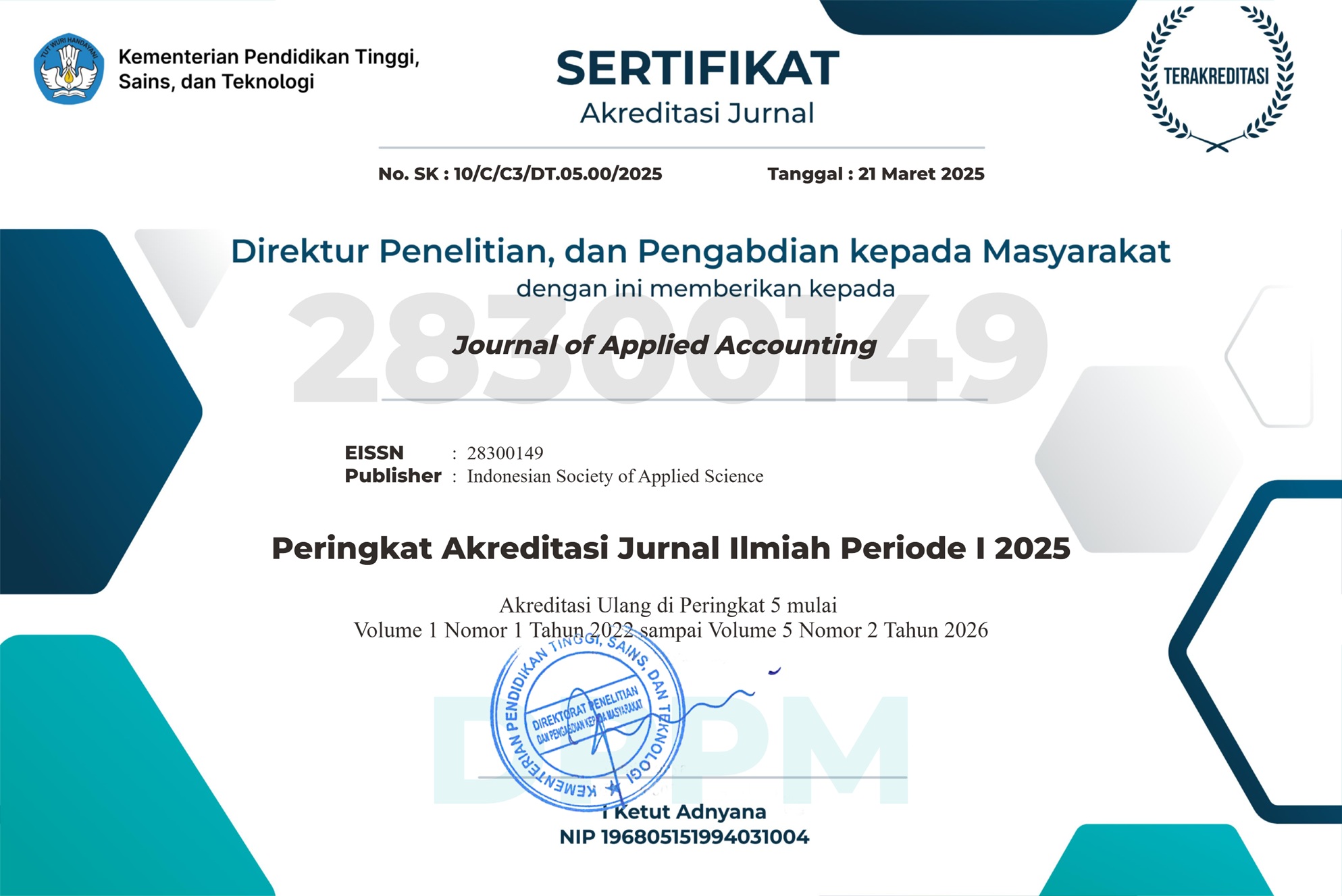Achieving Sustainable Development Goals (SDGs) Through Government Effectiveness and Control Over Corruption (A Cross-Country Study)
DOI:
https://doi.org/10.52158/jaa.v3i2.1051Keywords:
Sustainable Development Goals (SDGs), Corruption Control, Government Effectiveness, Political Stability, SDG 16Abstract
This research is driven by the enormous challenges in achieving the Sustainable Development Goals (SDGs), often hampered by weak governance and rampant corruption in many countries. Therefore, this research aims to determine the impact of controlling corruption and the effectiveness of global governance on achieving SDG 16. The method used in this research is purposive sampling using cross-country quantitative data from 2017 to 2021, with the final sample consisting of 145 countries and a total of 725 observations. Data is collected from various international sources such as the World Bank, Transparency International, Sustainable Development Report, and Human Development Report. Hypotheses were formulated and tested using multiple linear regression analysis using the STATA-17 software program. The research results show that government effectiveness and the Corruption Perception Index (CPI) positively affect achieving SDG 16. Countries that score higher in indicators of government effectiveness and control of corruption tend to make better progress in achieving SDG 16, and vice versa. Therefore, strengthening efforts to achieve SDG 16 requires political reform to strengthen state institutions, increase transparency and accountability, and ensure effective control over anti-corruption.
References
Agu, J. C. Nkwo, F. N.Eneiga, R. U. (2024). Governance and Anti-Corruption Measures in Nigeria : Strategies for Enhancing Transparency , Accountability and Public Trust. International Journal of Economics and Public Policy, 8(1), 1–15. Retrieved from https://airjournal.org/ijepp/
Alesina, A., & Perotti, R. (1996). Income distribution, political instability, and investment. European Economic Review, 40(6). https://doi.org/10.1016/0014-2921(95)00030-5
Almaqtari, F. A., Elsheikh, T., Hussainey, K., & Al-Bukhrani, M. A. (2024). Country-level governance and sustainable development goals: implications for firms’ sustainability performance. In Studies in Economics and Finance (Vol. 41). https://doi.org/10.1108/SEF-05-2023-0272
Alshubiri, F., Jamil, S. A., & Fekir, S. (2023). Corruption Control, Government Effectiveness and Banking Stability: Does Corruption Grease or Sand the Wheels? Journal of the Knowledge Economy. https://doi.org/10.1007/s13132-023-01277-x
Barbier, E. B., & Burgess, J. C. (2021). Institutional quality, governance and progress towards the SDGs. Sustainability (Switzerland), 13(21). https://doi.org/10.3390/su132111798
Bevir, M. (2011). Governance and governmentality after neoliberalism. Policy and Politics, 39(4). https://doi.org/10.1332/030557310X550141
Bouckaert, G., Chawdhry, U., Fraser-Moleketi, G., Meuleman, L., & Pizani, M. (2018). Effective governance for sustainable development: 11 principles to put in practice. SDG Knowledgs Hub.
Bowen, K. J., Cradock-Henry, N. A., Koch, F., Patterson, J., Häyhä, T., Vogt, J., & Barbi, F. (2017, June 1). Implementing the “Sustainable Development Goals”: towards addressing three key governance challenges—collective action, trade-offs, and accountability. Current Opinion in Environmental Sustainability, Vol. 26–27, pp. 90–96. Elsevier B.V. https://doi.org/10.1016/j.cosust.2017.05.002
Brewer, G. A., Choi, Y., & Walker, R. M. (2008). linking Accountability, corruption, and government effectiveness in Asia: an examination of World Bank Governance Indicators. Research in Public Policy Analysis and Management, Vol. 17, pp. 227–245. https://doi.org/10.1016/S0732-1317(08)17012-9
Chong, S. P. C., Tee, C. M., & Cheng, S. V. (2021). Political institutions and the control of corruption: a cross-country evidence. Journal of Financial Crime, 28(1), 26–48. https://doi.org/10.1108/JFC-05-2020-0094
Driessen, P. P. J., Dieperink, C., van Laerhoven, F., Runhaar, H. A. C., & Vermeulen, W. J. V. (2012). Towards a Conceptual Framework for The Study of Shifts in Modes of Environmental Governance - Experiences From The Netherlands. Environmental Policy and Governance, 22(3), 143–160. https://doi.org/10.1002/eet.1580
Faradila, S., Saud, S., Andi, ;, & Furqan, C. (2024). The Effort to Realize Government Effectiveness through Implementation of Fully Accrual Accounting and Control Against Corruption. AKRUAL: Jurnal Akuntansi, 15(2), 2085–9643. https://doi.org/10.26740/jaj.v15n2.p128-p136
Fung, A., & Kennedy, J. F. (n.d.). Articles on Collaborative Public Management.
Furqan, A. C., & Din, M. (2019). Social perception on corruption and its influence on public legitimacy and open government (Indonesia). Espacios, 40(13).
Furqan, A. C., Wardhani, R., Martani, D., & Setyaningrum, D. (2020a). The effect of audit findings and audit recommendation follow-up on the financial report and public service quality in Indonesia. International Journal of Public Sector Management, 33(5), 535–559. https://doi.org/10.1108/IJPSM-06-2019-0173
Furqan, A. C., Wardhani, R., Martani, D., & Setyaningrum, D. (2020b). The effect of audit findings and audit recommendation follow-up on the financial report and public service quality in Indonesia. International Journal of Public Sector Management, 33(5), 535–559. https://doi.org/10.1108/IJPSM-06-2019-0173
Galeazzo, A., Miandar, T., & Carraro, M. (2024). SDGs in corporate responsibility reporting: a longitudinal investigation of institutional determinants and financial performance. Journal of Management and Governance, 28(1), 113–136. https://doi.org/10.1007/s10997-023-09671-y
Glass, L.-M., & Newig, J. (2019). Governance for achieving the Sustainable Development Goals: How important are participation, policy coherence, reflexivity, adaptation and democratic institutions? Earth System Governance, 2, 100031. https://doi.org/10.1016/j.esg.2019.100031
International, T. (2023). ANNUAL.
Johnston, M. (2005). Syndromes of corruption: Wealth, power, and democracy. In Syndromes of Corruption: Wealth, Power, and Democracy. https://doi.org/10.1017/CBO9780511490965
Kaufmann, D., Kraay, A., & Mastruzzi, M. (2011). The worldwide governance indicators: Methodology and analytical issues. Hague Journal on the Rule of Law, 3(2), 220–246. https://doi.org/10.1017/S1876404511200046
Kaufmann Daniel. (2009). Corruption and the Global Financial Crisis.
Laupe, S., Abdullah, M. I., Kahar, A., Saleh, F. M., Zahra, F., & Syamsuddin, N. A. (2022). AUDITOR’S SKEPTICISM, FORENSIC ACCOUNTING, INVESTIGATION AUDIT AND FRAUD DISCLOSURE OF CORRUPTION CASES. Journal of Governance and Regulation, 11(3), 189–196. https://doi.org/10.22495/JGRV11I3ART16
Leal, P. H., & Marques, A. C. (2021). The environmental impacts of globalisation and corruption: Evidence from a set of African countries. Environmental Science & Policy, 115, 116–124. https://doi.org/10.1016/J.ENVSCI.2020.10.013
Malito, D. V., Umbach, G., Savoia, A., & Hulme, D. (2021). Measuring Governance to Achieve Sustainable Development: Promises and Challenges. 547–559. https://doi.org/10.1007/978-3-319-95960-3_32
Meschede, C. (2020). The sustainable development goals in scientific literature: A bibliometric overview at the meta-level. Sustainability (Switzerland), 12(11). https://doi.org/10.3390/su12114461
Mombeuil, C., & Diunugala, H. P. (2021). UN sustainable development goals, good governance, and corruption: The paradox of the world’s poorest economies. Business and Society Review, 126(3), 311–338. https://doi.org/10.1111/basr.12241
Moreno-Serna, J., Purcell, W. M., Sánchez-Chaparro, T., Soberón, M., Lumbreras, J., & Mataix, C. (2020). Catalyzing transformational partnerships for the SDGs: Effectiveness and impact of the multi-stakeholder initiative el dia despues. Sustainability (Switzerland), 12(17). https://doi.org/10.3390/su12177189
Mungiu-Pippidi, A., & Dadašov, R. (2016). Measuring Control of Corruption by a New Index of Public Integrity. European Journal on Criminal Policy and Research, 22(3), 415–438. https://doi.org/10.1007/s10610-016-9324-z
North, D. C. (1990). Institutions, Institutional Change and Economic Performance. In Institutions, Institutional Change and Economic Performance. https://doi.org/10.1017/cbo9780511808678
OECD. (2021). Strengthening the recovery: The need for speed. In OECD Economic Outlook.
Osei, N. K. (2020). Issues Confronting Governance and Implementation: Sustainable Development Goals in Ghana. Journal of Public Administration and Governance, 10(3), 355. https://doi.org/10.5296/jpag.v10i3.17482
Putri Kurata Ayuni, N., & Syarief Hidayatulloh, F. (n.d.). THE ANTI-CORRUPTION INTEGRITY, WAY OF ACHIEVING SDGs 16: A SYSTEMATIC LITERATURE REVIEW. https://doi.org/10.5281/zenodo.10376929
Regan, P. M., & Norton, D. (2005). Greed, grievance and mobilization in civil wars. Journal of Conflict Resolution, 49(3). https://doi.org/10.1177/0022002704273441
Sachs, J. D. (2012). From millennium development goals to sustainable development goals. The Lancet, Vol. 379, pp. 2206–2211. Elsevier B.V. https://doi.org/10.1016/S0140-6736(12)60685-0
Sakinah, H., Chairil Furqan, A., & Meldawati, L. (2024). ACHIEVING THE SDGS THROUGH STRENGTHENING THE CAPABILITIES OF APIP AND CORRUPTION CONTROL IN INDONESIA (Vol. 1).
Sartor, M. A., & Beamish, P. W. (2020). Private Sector Corruption, Public Sector Corruption and the Organizational Structure of Foreign Subsidiaries. Journal of Business Ethics, 167(4), 725–744. https://doi.org/10.1007/s10551-019-04148-1
Shelton, D. (2024). Res. 2664 (U.N.S.C.) and Res. 52/13 (U.N.H.R.C.). International Legal Materials, 63(1). https://doi.org/10.1017/ilm.2023.33
Stott, L., & Murphy, D. F. (2020). An inclusive approach to partnerships for the SDGs: Using a relationship lens to explore the potential for transformational collaboration. Sustainability (Switzerland), 12(19). https://doi.org/10.3390/SU12197905
Transparency International. (2023). Annual report 2023. Transparency International Secretariat. https://www.transparency.org
UN. (2015). Global Sustainable Development Report: 2015 edition. Global Sustainable Development Report: 2015 Edition.
World Bank. (2020). Enhancing Government Effectiveness and Transparency: The Fight Against Corruption.
World Economic Forum: Global Risks Report 2019. (2019). Computer Fraud & Security, 2019(2). https://doi.org/10.1016/s1361-3723(19)30016-8














 This
This 